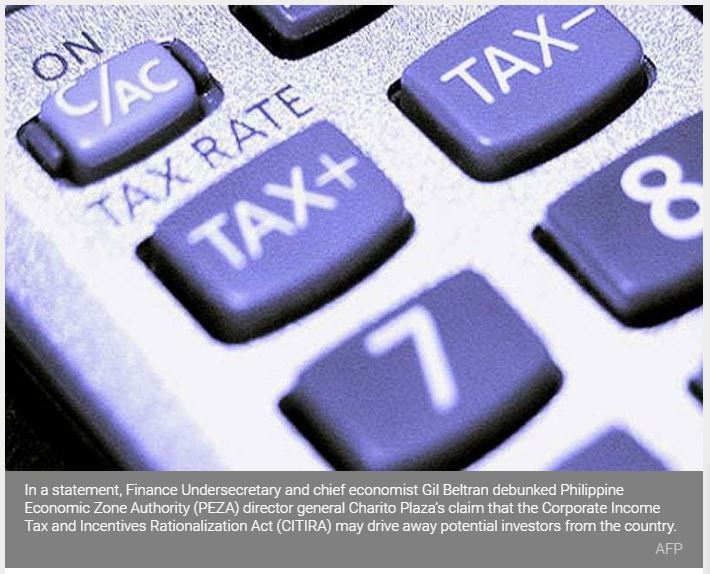Philippines – DOF: Investors becoming less reliant on incentives
MANILA, Philippines — Foreign investors -are becoming increasingly less reliant on incentives as a deciding factor in putting up their businesses in the Philippines, according to a senior official of the Department of Finance.
In a statement, Finance Undersecretary and chief economist Gil Beltran debunked Philippine Economic Zone Authority (PEZA) director general Charito Plaza’s claim that the Corporate Income Tax and Incentives Rationalization Act (CITIRA) may drive away potential investors from the country.
“We have to look at the bigger picture. Foreign direct investments (FDIs) have been on an upward trend since 2011. There is no doubt about that,” Beltran said.
Furthermore, Beltran said FDIs are becoming “increasingly non-reliant on incentives,” as shown by the decline in PEZA investment pledges over the previous years.
“Since our fundamentals are in place, incentives are becoming less and less of a factor for investment. Even before CITIRA or TRABAHO (Tax Reform for Attracting Better and High Quality Opportunities) was proposed, PEZA investment pledges have been going down,” Beltran said.
“Furthermore, it seems that investors lately do not base their pledges on incentives given forever. In 2018, the largest amount of investment pledges came from firms registered with the Board of Investments (BOI), which does not grant incentives forever. Investment pledges with the BOI in 2018 amounted to $1.97 billion. Those with PEZA only amounted to $1.3 billion,” he said.
CITIRA contains Package 2 of the Duterte administration’s Comprehensive Tax Reform Program. It seeks to lower the corporate income tax rate from 30 percent to 20 percent, while rationalizing fiscal incentives to make them more performance-based, time-bound, targeted and transparent.
Despite PEZA’s opposition against the measure, Beltran said the DOF would not stop pushing for the fiscal incentive reform.
“Plaza said they are ready for war, but we would at least expect them to be armed with correct information,” Beltran said, adding that the statements made by the investment promotion agency have been “largely erroneous and misleading.”
Previously, the DOF also debunked Plaza’s claim that PEZA generated over P10 trillion in contributions to the economy from 2015 to 2017.
Beltran claimed that the IPA’s contribution to the economy is not as huge as portrayed, especially when compared with the amount of incentives PEZA has given away over the past few years.
“An estimated P5.5 trillion in tax incentives was given to PEZA firms since 1995, while, in return, investment pledges with PEZA over that period amounted to only P3.6 trillion. This means that PEZA gave out more than it got back in promises of investments in the economy. And note that this amount constitutes promises only. Is this not a signal that we have to look more closely at our incentive system and account for the money we give out? That is what CITIRA seeks to do,” the DOF economist said.
He further said that Plaza’s claim that CITIRA would hinder the development of small and medium enterprises (SMEs) is unfounded.
“Package 2 will actually help more than 989,000 micro, small, and medium enterprises (MSMEs) by gradually lowering the corporate income tax (CIT) rate from 30 to 20 percent, thereby decreasing their tax burden. Only 3,150 firms received tax perks, which all in all amounted to P441 billion, or 3.2 percent of gross domestic product (GDP), in 2017.”
“In addition, Package 2 will actually help spur development across the Philippines,” Beltran said.
Source: https://www.philstar.com/business/2019/09/30/1955985/dof-investors-becoming-less-reliant-incentives#cQHWRhm147wg07xI.99


 English
English




